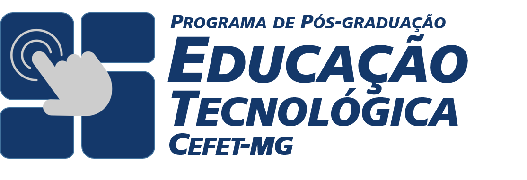
The Postgraduate Program in Technological Education (PPGET) is part of the postgraduate programs of the Federal Center for Technological Education of Minas Gerais (CEFET-MG) and is responsible for offering the Master’s Course in Technological Education. Its academic activities started in 2005 and it is one of the pioneers in the history of postgraduate courses at the institution. It has been responsible for the formation of more than 400 Masters.
The Program's faculty is currently comprised of 18 professors and it also counts on 3 technical and administrative public servants. It attends an average of 120 regular students and 100 non-regular ones enrolled in our disciplines. As part of its constitution, the PPGET's mission is to produce knowledge in the area of Education, training qualified professionals capable of innovating and contributing to scientific, technological and social development, with professional skills for acting in Professional and Technological Education, in teaching in Higher Education and in the productive and service sectors, based on an articulated and organic understanding of the interrelationships that involve science, technology and culture in a broader social context.
AREA OF CONCENTRATION
PPGET adopts Professional and Technological Education as its area of concentration, understood as a specific subfield of Education, which expresses the substantive symbiosis between work, culture, science and technology in the contemporary world and its relationship with education.
Due to its dimension, social impact and the range of problems offered, Professional and Technological Education is not only an object of episodic or specific studies. The formulation of public policies, the management of institutions and the pedagogical practices in this field demand specialized professionals, capable of thinking about it in its particularities. This implies considering a framework of needs and possibilities that reproduces the most general issues of Education, articulated with the specificity of its own history, institutionality and public policies. It is, therefore, an object and an emerging subfield which requires the constitution of an expertise capable of assuming it as its own domain for scientific investigation.
The trajectory of PPGET, in advancing and expanding the knowledge produced in the study of research objects related to Professional and Technological Education, has been consolidated by its prominence in the development of studies and research in this field, in its region, as well as by the growing number of candidates interested in joining the course.
LINES OF RESEARCH
Currently, the area of concentration of the PPGET is subdivided into four lines of research, in which the studies and research are developed, namely:
Line I - Fundamentals of Technique, Technology and Work within the Scope of Technological Education
Line of Research I covers several perspectives in order to decode the technical and technological reality. It aims to base reflections on Technological Education in the various philosophical dimensions (ethical, epistemological, anthropological etc.) of technique and technology, as well as their impacts on the spheres of work, subjectivity and the human constitution in a general sense. The research carried out within the scope of Line I is varied, encompassing both reference theses in the philosophical studies of technique and technology as well as broader issues regarding technological reality. In this sense, the professors who make up Line I are interested in everything from classic and modern conceptions to contemporary views regarding technique, technology and work.
Line II - History and Historiography of Professional Education
Line of Research II proposes to investigate Professional Education as a historical object. Its field of insertion is the History of Education and, more specifically, the History of Professional Education as a subfield. The Professional Education as an object covers studies and research on education intellectuals and thinkers, Americanism and its repercussions on Brazilian education, the history of female education, the history of educational institutions, the history of public policies for education, theories and historical research methods.
Line III - Formative Processes in Professional and Technological Education
Line of Research III covers studies and research on formative processes in the areas of Professional and Technological Education, both in the educational field and in social and work relations. Its thematic emphases focus on historical, social, psychosocial and cultural processes; in the development and mobilization of professional and teaching knowledge and skills; in the relations between work, education, science, technology and society in its various interfaces.
Line IV - Educational Practices and Educational Technologies
Line of Research IV focuses on understanding the teaching and learning processes that take place in different learning environments, whether face-to-face or virtual, formal or informal, as well as in educational practices mediated by different educational technologies, digital or analogue. It considers issues related to Vocational and / or Technological Education. Among the investigations developed in Line IV, the following themes are evidenced: teaching practices based on different mediational resources (models, analogies, analog models, metaphors etc.); development and appropriation of teaching methodologies; training and performance of teachers of Natural Sciences and their technologies; learning environments; learning and educational practices based on project methodologies; pedagogical mediation in science and technology centers and museums.
Linked to these lines, PPGET professors and students are part of Project and Research Groups whose study objects are aligned with the Program's area of concentration.
PPGET Secretary: Marcus Vinícius Sousa do Amparo
Telephone number: (31) 3319 6806
Email address: et.cefetmg@gmail.com



